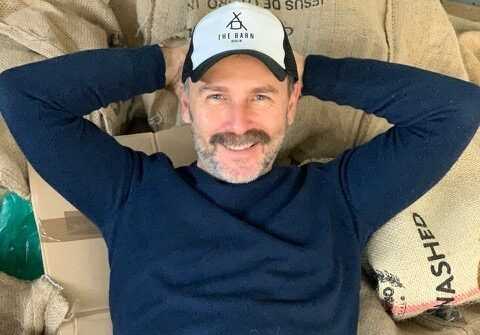Share your coffee stories with us by writing to info@comunicaffe.com.
BERLIN – Today we head to the German capital and pretend to be sitting at one of the tables of The Barn, waiting for to take a coffee break while chatting with the creator of this coffee shop, Ralf Rueller, about how it all began and developed around a passion for quality coffee. Let’s find out his vision of a coffee shop, of coffee roasting and of the coffee drinking experience.
The Barn: roastery and coffee shop. How and when did these two souls of your company develop and how are they intertwined?
“I’ve started this company in 2010 as a Specialty coffee shop in Berlin’s Barn District and I focused on three things that I felt very passionate about: one is serving the best coffee out there and serving it in a way that is doing justice to farms and their terroir. Specialty Coffee to me is specialty coffee that is not only a branding word. I am a Specialist and I am creating a market by presenting coffee in the best possible way. And by sharing the farm story with my customers. So I can connect them to the source and I can create a sensory memory that connects the customer to the coffee.
I follow its Specialty Coffee principles and I constantly push it to a higher level: I am only sourcing coffee from relationships farms, only single origin coffees. We’re pushing quality by roasting coffees light and to perfection: At THE BARN we’re developing individual roast curves to present the personality and characteristics of each coffee and its terroir.
Terroir is a very important point for us: we’re presenting flavours of the field and we want our customers to engage with that. And in order to do so, we need to do two things: to serve our coffee as best we can (without sugar, syrup, trying to avoid milk). And to share our knowledge about the farm and the coffee with our customers.
We always follow one principle: we want to present coffee as best we can, and when we serve drinks we want our customers to engage and explore the coffee flavours (and not any syrup flavours).
When I started my café I had (and still have) a very puristic menu: small milk quantities, we never put cold milk in our drinks. We never serve our hand brewed single origin coffee with milk, only black. And we have the sugar pot far away from the bar. We recommend our customers to drink our coffees without any additional sweetener: Our coffees are already sweet by nature.
A year and a half after I opened my café I’ve started roasting coffee. In Germany, I could not find any roaster that would fit my requirement for coffee quality.
In Germany there was no quality and I would say that there is very little quality around me still: and by that I mean, people that focus on the product, that work and help farmers to get better and to pay them better in return, and people that are explaining coffees and sharing knowledge with their customers. Our customers need to engage with our coffees and learn about the farms that we work with. The only way we can do that is by letting them taste the coffees in the way.
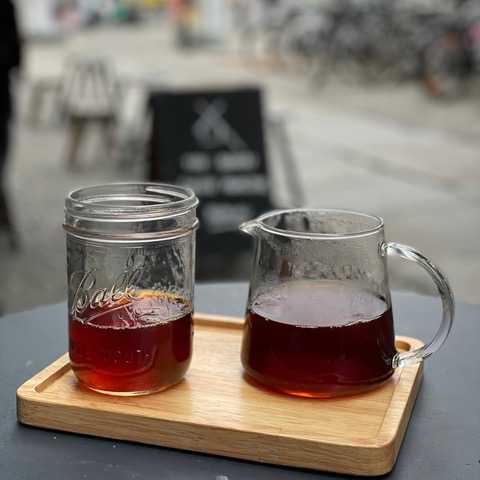
Our baristas are trained to share their knowledge and the farmers’ stories, so that people can learn. This way we create a market for the higher end of specialty coffee.”
How are the coffee shop and the roastery connected?
“That is an important question for me: we’ve an integrated model. It starts with all the coffee farms with whom I’ve developed a personal relationship. They offer us the first pick of each harvest (meaning: We can choose first which lots we are buying from them). We then bring coffees over to Berlin: fresh in season. The connection between our baristas and our roasters is very strong. We have eleven shops in Berlin and we have baristas from more than 30 different countries. And everyday they’re putting their feedback on the performance of our coffees in our google sheets: Each coffees, which roast date, what flavours, what recipes, which water quality: and their feedback goes back into our roast process. So we keep a tight bracket between roaster and barista.
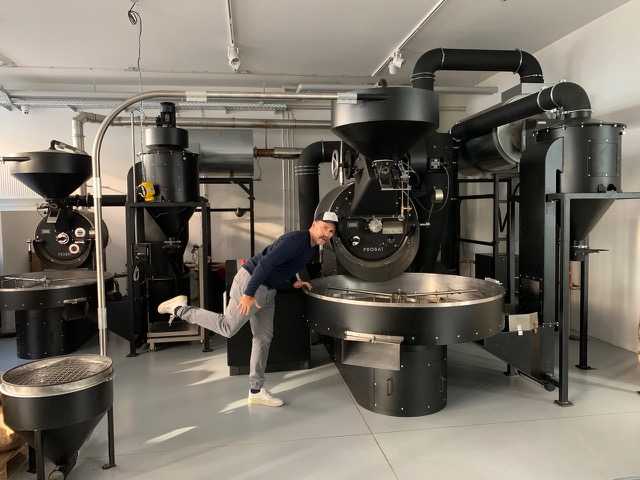
That is quite important for our consistency and to develop our roast curves. It also keeps my front end connected to our production. It also enables us to give recommendations to our b2b customers. We ship more than 90% of our weekly bean production internationally. THE BARN is the most recognised German Specialty Coffee Brand internationally.”
How many outlets do you have? Most of them are in Berlin, do you plan to go beyond this national border?
“Eleven cafés in Berlin, plus a roastery with the annex café and training center. And we
have just opened in Dubai in October 2021. So: 12”.
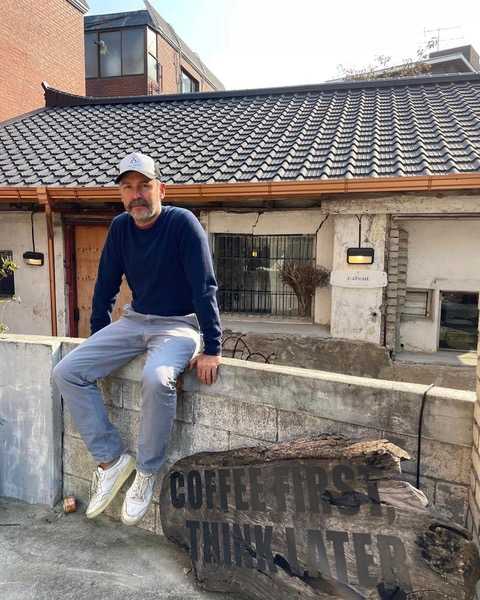
How do you select your suppliers, where does your coffee come from and how do you process it?
“I travel to all our coffee farmers and established very strong relationships over the years: it’s very important to me that we go back to coffee growers and we work with them so they have a chance to better understand what we need. I want to give them the confidence that we’re coming back, because they have to invest in more labor, drying beds, processing, improving their organic and sustainable practises.They ultimately need to give us higher qualities. For that, they have to select our sub-average coffee qualities that go to the secondary market.
We want to help farmers to produce more grade-one-quality and we have several examples for that. Take Mohamed Ali in Ethiopia for instance: when we engaged with him he had only 20% grade-ones, and now over 70%. For which we pay highly. I would say on average that our prices are more than 3 times of Fairtrade.
The growers usually come to us: They know about us. When we look at potentially new coffee growers, we want to see what land they have. And they have a passion for coffee growing and if they want to change what they’re doing. Essentially we’re slowing farmers down, we’re focusing them on quality and we pay them more for their work. It’s a win-win situation: we get better coffee, and the farmers receive more money. They also identify with their product and we have a very close relationship with them. In this way, they’re very motivated to get better. “
How would you define a quality coffee?
“It’s very easy because we can score it: we only buy from 86 points and more. We want to have three distinct flavors: we want to taste acidity, we want clearity, and we want flavors of the field. To me, seasonality is quite important. I’m also a big fan of not having strawberries in the supermarket in the winter time. I want them in the summertime. Just as much I want my few bean coffees when they’re fresh in season.”
How much has the coffee market changed in Germany since you opened THE BARN?
“How can you change the direction of a ship like the Titanic? It takes time! We make a lot of noise, we’re teaching people and we’re pushing the envelope of quality. We want to
be seen as the standard for specialty coffee and we want others to follow our way. We want other roasteries and coffee shops to focus on the product and not on the packaging or on the branding or on the music in the shop, or on the look of the barista. The focus has to be the cup quality and we all have to talk about the farms. Another aspect for this is the current situation: Climate Change.
We have freaky weather, we have coffee diseases and so we need to work with farmers to help them to get better, focusing on different processing styles so that we can elevate the cup quality and they can get more money for their hard work. The only way to do that is to present their coffee at the best possible level and to share knowledge with the market, so that the market can understand what this is all about. There is a big trend and that’s the commercialization of specialty coffee: Business owners are building beautiful shops, they have nice baristas, but they don’t really focus on their coffee beans that they’re buying. This has to stop.”
Is specialty coffee a niche product in Berlin? What kind of coffee do Germans drink?
“In Germany we have more specialty coffee shops now, but as I mentioned they are far too commercial and not interested in the product. They run them simply as a business. In Berlin we have a lot of new coffee shops but in many ways they’re more like Australian brunch concepts with avocado toast and poached eggs. They have no ambition to pay up more for their coffee beans and very few offer single origin coffees. Specialty coffee has the word “specialist” in it: I would expect people that put this name on their door to behave more like someone that is interested in doing something very special. To me, it’s an honour, it’s to the craft.”
Which machines have you chosen for your coffee shops and why? And how much do you sell espresso for?
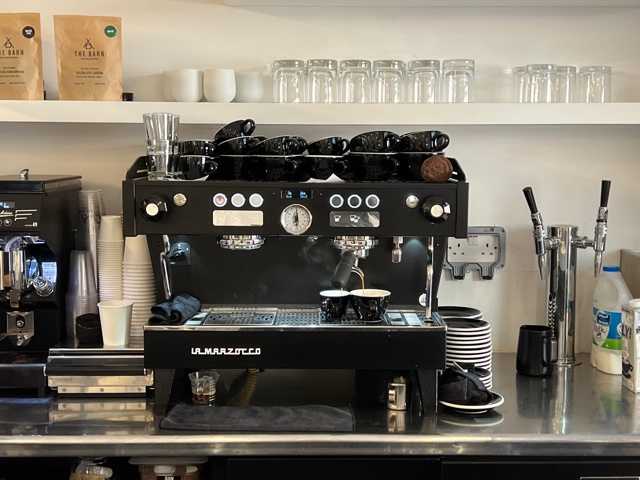
“We started with Synesso machines but we shifted to La Marzocco: They give us all that we need: we’re working with Linea PBX, with integrated scales. We have Mythos 2 grinders with integrated scales as well. The pressure profiling and the temperature control is
quite important to us. We are not having fancy coffee machines, such as Kees Van Westen or Strada: We don’t need a Ferrari to impress. We need a solid machine, great beans and a trained passionate barista to get the best out of our coffees. The price of espresso: around 2.50/3 euros.”
Is Italy an interesting market for THE BARN?
“Probably on the retail side I’m sure we have a lot of subscribers in Italy as well: we ship into 82 countries with our monthly coffee subscription service. In terms of B2B, Italy is not a key market for us. I think, similar to Germany, Italy is an inflexible, old and established market. Italy is importing a lot of low quality coffee and I think that needs to change. I think that market is there. There’s a lot of people in larger cities that are able to pay more: you just need a good coffee shop and a good barista that are willing to break the ice, like I did in Berlin.
When I opened my first café, some people said: “You have to do this, you have to do that, otherwise nobody will come to your café!. Well, I’ve proved them wrong.”
How did you and how are you dealing with the pandemic? Has the away-from-home sector reacted well to the restrictions? Has the government helped the sector?
“Pandemic: I don’t want to hear that word any longer. It’s painful. For the last two years it has been very difficult for us: we had to pay a lot of rent for all our units and we didn’t get any governmental support. I fully relied on the loyalty of my international wholesale customers and on my online business. Of course the online segment went up massively during the pandemic. We saw a flight to quality. We created a lot of new products. For example: when we were in the first lock-down and closed the coffee shop we had a lot of coffee retail bags of beans. So we created a home-bean-box with 4 coffee bags in them. But people could not choose the coffees and they did not know what exactly they were getting. Instead of offering discounts (which I think is a huge mistake when you operate in a premium market), we offered different values.
We also started with our masterpiece subscription, roasting high quality Geishas. Once a month people are getting a fantastic coffee that’s scoring over 90 points, a coffee that’s very rare.
We also wanted to reach more people with great coffee. Many people know that I hate Nespresso capsules because they taste awful and have high waste of aluminum. But we found a capsule in Germany made from recycled wood and we also found a company that’s filling those capsules to our specifications so we use light roast. So we now have a capsule that is sustainable and it tastes good. And we can reach more people now with great coffee!
We also started instant coffee with SWIFT Coffee in America. And we created a drip bag, which is very popular in Asia and in The Middle East. When we create a new product, they need to fulfill two conditions: they must have a sustainable packaging and the coffee needs to taste great.
With our new products we can reach more people with different techniques. And they can make Specialty Coffee more conveniently, for instance when they are hiking, or on a train, or on a plane.”
Is finding qualified staff also a problem there in Berlin?
“The big Quit” you can read about in the papers. Ja, it’s difficult all across the world to find good staff for cafés and restaurants at the moment. Luckily we offer training: we’re known for quality. People are moving to Berlin to work with us because they know they’re learning and they are working with the best coffees.”
What are the next projects for THE BARN?
“To bring back up performance of our Berlin base cafés. We hope that our government comes to its senses very soon and drops all the restrictions. Like the Uk and Denmark are
already doing. So we can all move on and get a great vibe back in our coffee shops. Our baristas love to make people happy with great coffees in a busy coffee shop: that’s our highest priority at the moment.”
To know more, you can go directly to Berlin or get a first taste from the coffee shop website, here.



